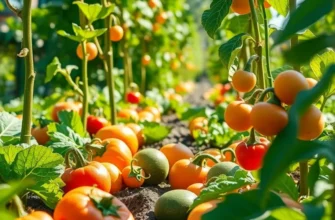Nigeria’s culinary traditions are a vibrant blend of flavors, ingredients, and customs that tell the stories of its diverse cultures. Home to over 250 ethnic groups, each region boasts its own distinct culinary practices influenced by history, geography, and local ingredients. From the spicy stews of the North to the rich soups of the South, these dishes are not just sustenance but a social experience, a celebration of community and heritage. Let’s dive into the heartwarming culinary customs that define Nigeria’s food culture.
Culinary Heritage: A Melting Pot of Flavors

Nigeria’s culinary landscape mirrors its remarkable tapestry of cultures, each region boasting unique flavors and cooking traditions. From the rich stews of the west to the spicy soups of the east, every dish tells a story that blends age-old traditions with local bounty.
The western part of Nigeria is renowned for its hearty dishes, such as Efo Riro, a spinach stew enriched with palm oil, meats, and seasoned with a blend of indigenous spices. Yam, often boiled or pounded, serves as a staple, complementing the flavorful stews. Grilling is a common method, accentuating the flavors of ingredients like fish and chicken.
In contrast, the eastern regions favor soups enriched with spicy pepper relish, commonly found in dishes such as Nsala and Ofe Akwu. Staples like cassava and rice form the base of many eastern meals. These dishes exemplify the use of ugu leaves and uziza seeds, which impart a bracing, woodsy aroma.
Northern Nigerian cuisine borders the aromatic world of spice and simplicity. With a noticeably lighter palate, dishes here boast grains such as millet and sorghum, often transformed into Tuwon Shinkafa, a rice dough dish. Grains are skillfully paired with vegetables and meats in cooking methods like stewing, highlighting the spices and herbs’ delicate notes while ensuring rich, layered flavors.
Each region of Nigeria values communal dining, celebrating the essence of togetherness through shared meals. Breaking bread is more than sustenance; it is a ceremonial chapter of community, bonding people over shared recipes and cherished flavors.
Key ingredients, like Scotch bonnet peppers, are pivotal across the nation. These fiery peppers, along with garlic and ginger, are foundational to many meals, providing the much-loved heat and zest that define Nigerian cuisine. Aromatic herbs such as thyme and scent leaves enhance dishes, bridging the culinary gap between regions.
Exploring Nigeria’s local produce uncovers ingredients like yams, cocoyams, and plantains, which serve various functions in meals. These carbohydrates satisfy and fill, creating dishes that are warming and nurturing, a testament to the traditional Nigerian household. The transformation of plantains through methods like frying or boiling offers yet another illustration of the culinary diversity across the regions.
Cooking methods such as grilling, stewing, and frying are integral to the preparation of traditional Nigerian meals. Grilling accents meat and fish with a smoky depth, while stewing allows for the rich, slow meld of flavors, often featuring tomatoes, onions, and a medley of spices. Frying, particularly in palm oil, gives dishes a cherished vibrancy.
To further understand the critical relationship between food and culture, consider exploring how spices and herbs in different cuisines influence nutritional outcomes here. Nigeria showcases this interplay vividly, with spices not only enhancing taste but also nourishing its people.
Together, these elements create a vivid tapestry of Nigerian cuisine, inviting both participation and exploration, each meal a celebration of the country’s rich heritage.
Celebrations and Rituals: The Role of Food in Nigerian Culture

In Nigerian culture, food is more than just sustenance—it is a vehicle for cultural expression and community bonding. This is especially evident in the celebrations and rituals that punctuate the lives of Nigerians. Each dish served during these occasions tells a story and strengthens the social fabric that binds individuals together.
Weddings, for instance, are grand affairs that bring communities together through elaborate feasting. The traditional Yoruba wedding is incomplete without the presence of jollof rice and fried plantains, dishes that symbolize joy and abundance. Similarly, in Igbo weddings, ofu soup with fufu is served, reflecting the community’s agricultural roots and culinary heritage. These meals are not just about the flavors and aromas, but are a tribute to ancestral traditions.
Festival times in Nigeria are marked by a rich array of foods that vary from region to region, yet all share a common purpose: communal celebration. The New Yam Festival, predominantly celebrated by the Igbo people, is a vibrant testament to the significance of food in cultural identity. Yams, an essential crop, are prepared in myriad ways—boiled, roasted, or pounded—as a sign of thanksgiving and community unity.
At the heart of Nigerian gatherings is the act of sharing meals, which builds bonds and fosters a sense of belonging. In both urban and rural settings, the communal sharing of meals symbolizes trust and solidarity. The concept of “breaking bread together” transcends simple consumption, transforming each meal into a ceremony of togetherness.
Meal preparation itself carries an element of ritual. Traditional practices often involve communal participation, where family members and friends come together to cook, support, and learn from one another. The process strengthens familial ties and ensures the transmission of culinary knowledge across generations. For those interested in integrating some traditional techniques from global cuisines into their cooking routines, exploring the history of cooking methods can provide valuable insights.
Hospitality in Nigerian culture is central to every gathering. Guests are greeted with generosity, regardless of social status or economic condition. It is customary to offer visitors a full meal, as hosting without food is considered a faux pas. This culture of hospitality not only highlights the significance of food but also serves as a mirror reflecting the warmth and openness of the Nigerian spirit.
In essence, food in Nigerian culture is an expression of identity, gender roles, and social cohesion. Its role in celebrations and rituals underscores food as a profound cultural symbol—an embodiment of both heritage and hospitality. Through nourishing both the body and soul, food secures its place as a pivotal element in Nigerian social customs.
Final words
Nigeria’s culinary customs present a breathtaking tapestry woven from its rich history, ethnic diversity, and the communal spirit that defines its people. Each dish tells a story—spicy stews inviting warmth and togetherness, and intricate soups celebrating seasonal harvests. Through food, Nigerians not only nourish their bodies but also strengthen family bonds and cultural identity. By exploring these culinary traditions, food enthusiasts gain a deeper understanding of the soul of Nigeria, where every flavor is a taste of history and heritage. This exploration promises a journey of discovery that fuels curiosity and appreciation for the world of global cuisines.








